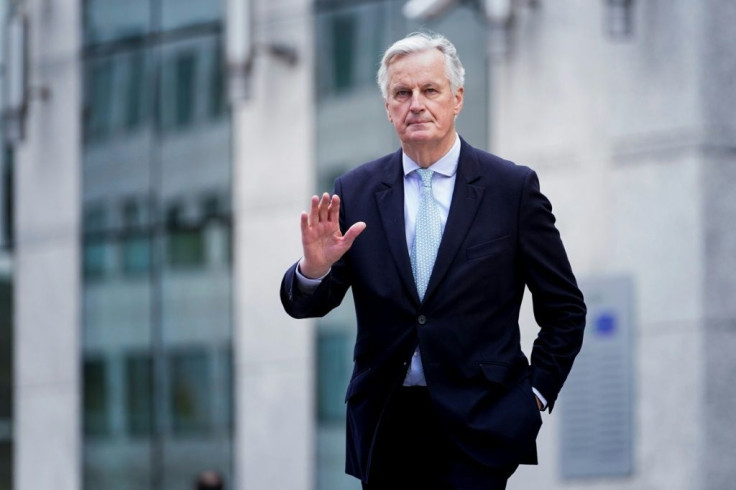Brexit Chaos: UK Threatens To Walk Away From EU Trade Talks By June

KEY POINTS
- UK wants a “Canada-style” trade agreement with the EU
- UK said it wants to assert its sovereignty and independence
- EU’s chief Brexit negotiator Barnier said UK must abide by terms it already agreed to
British Prime Minister Boris Johnson has threatened to walk away from post-Brexit trade negotiations with the European Union by June if he determines that he cannot obtain a “Canada-style” trade agreement with the trading bloc.
A “Canada-style” agreement refers to the comprehensive trade deal that the EU signed with Canada which removed almost all tariffs and increased quotas on certain products. However, that deal did not require Canada to join the EU, nor adopt its rules nor permit the free migration of citizens.
The U.K. government’s negotiating mandate for the next stage of Brexit agreements were released on Thursday and indicated that Johnson may not abide by certain terms previously agreed to, including how much Britain has to adhere to EU regulations (i.e., the “level playing field”), how the overall deal will be managed and monitored and the extent of fishing rights the U.K. will give bloc members in its waters.
"The [U.K.] government would hope that, by that point [June], the broad outline of an agreement would be clear and be capable of being rapidly finalized by September,” Johnson’s mandate stated. "If that does not seem to be the case at the June meeting, the government will need to decide whether the U.K.'s attention should move away from negotiations and focus solely on continuing domestic preparations to exit the transition period in an orderly fashion."
The U.K. also said it will not permit the EU’s Court of Justice to have any jurisdiction in Britain and it also reserved the right to make its own laws on taxes and state subsidies.
“We want the best possible trading relationship with the EU -- but in the pursuit of the deal, we will not trade away our sovereignty,” said Cabinet Office Minister Michael Gove.
Bloomberg reported that Britain is “setting a tough timetable for the negotiation” and that its “emphasis on sovereignty risks making it harder to reach a deal with the EU.”
The EU has asserted that given the size of Britain’s economy and its geographic location, it cannot have the same kind of trade deal that Canada signed.
“Geography is no reason to undermine democracy,” Gove added. “To be clear, we will not be seeking to dynamically align with EU laws, on EU terms governed by EU laws and EU institutions.”
The U.K. also does not want to be subject to EU regulations on labor and environmental matters, nor will it be subject to the European Court of Justice.
The EU argued that Britain must abide by the terms of the “political declaration” -- the non-binding segment attached to the EU Withdrawal Agreement it signed earlier.
The “political declaration” established various ground rules for a trade deal.
“We want an ambitious and fair partnership with the U.K. in the future,” said Michel Barnier, the EU’s chief Brexit negotiator. “We will stick to all our prior commitments in the political declaration.”
Barnier also said: "Promises were made [by the U.K.] to cooperate with us, to make sure there's no form of unfair competition. The text in the political declaration needs to be properly respected and implemented to the letter in a legal framework."
The Telegraph reported that Johnson thinks he has the right to ditch the ground rules he agreed to due to the promises made by the Conservatives in their election manifesto, which, among other things, sought to upgrade Britain’s sovereignty and independence from the EU.
"The Prime Minister's mandate was derived from the manifesto, which was published after the agreement of the political declaration and is very clear about the [U.K.] government's intention, which is to get a Canada-style trade agreement and take back control of our borders, laws and money," said a Conservative official.
Johnson’s spokesman asserted that "the withdrawal agreement is an international treaty -- the political declaration is not of that status,” said
However, both sides – the U.K. and EU – have assure they want to hammer out a deal somehow.
"We are ready to offer to the U.K. super-preferential access to our markets – a level of access that would be unprecedented for a third country,” assured Barnier. "Is this something we can do without firm guarantees that the U.K. will respect the 'level playing field' and avoid unfair competitive advantages? The answer, I'm afraid, is simple. We cannot. We want competition in the future but it must be fair -- fair and free."
Barnier further said that regardless of how trade talks evolve, the EU will closely inspect goods entering Europe from Britain starting in 2021.
“Of course we love 'Made in Britain' but we must guarantee that the goods we import from the U.K., tariff and quota free, really are British,” he explained. "We cannot take the risk that the U.K. becomes a kind of assembly hub for goods from all over the world, allowing them to enter the single market as British goods."
Sam Lowe, a senior research fellow at the Center for European Reform, said a compromise “will no doubt be difficult. What is perhaps surprising is just how aligned the EU and U.K. are with regard to the nature of the eventual trade agreement.”
© Copyright IBTimes 2025. All rights reserved.





















